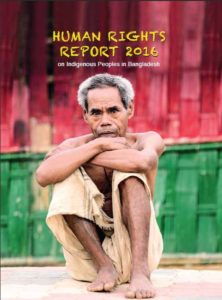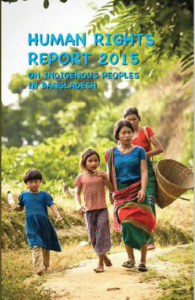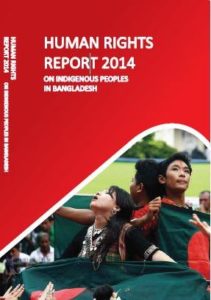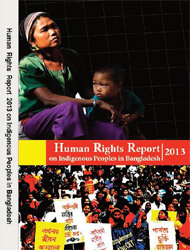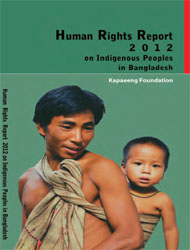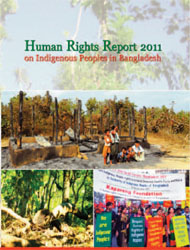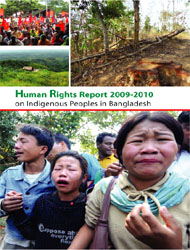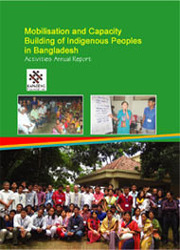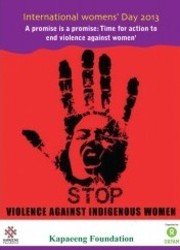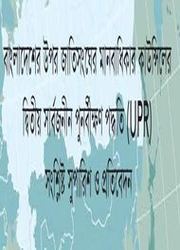Communal attack on indigenous Santal villagers by Bengali land grabbers in Tanore where five houses burnt to ashes
On 23 April 2012 at around 2.00 am 5 houses of indigenous peoples of Shikpur village of Tanore upazila under Rajshahi district were set on fire by the Bengali land grabbers when the indigenous villagers were sleeping deeply in their homes. Consequently, 4 houses were fully and one house was partially burnt to ashes. Concerning the incident Mr. Chutar Murmu filed a case against 3 persons with Tanore police station.
It is learnt that 35 indigenous Santal families have been living on the 23 Bigha land of Shikpur village which is recorded in their name since 1922, by constructing houses for past six months. A group of Bengali land grabbers led by Md. Korban Ali (45) s/o late Soimuddin, Md. Anarul (35) s/o Khairul Islam and Md. Mofijul Islam (40) s/o Kabil Chowkidar of Shikpur village of Tanore upazila of Rajshahi district has been trying to evict said Santal families from their land.
Several times the land grabbers threatened the indigenous villagers to leave the land. Otherwise they would burn their houses and abduct women from their homes. In this scenery, on 22 April 2012 the indigenous villagers fell asleep like usual days by 10 pm after having their diner. At around 2.00 am they realized that their houses had been set on fire by the perpetrators.
Chutar Murmu says, “At around 2.00 am when I woke up from sleep subsequent to hearing the screaming of my neighbour Lubin Baski, I found that my house was burning. When I came out of my house, I also found that the roof of the houses of my neighbours Lubin Baski (50) s/o Gare Baski, Josef Tudu (26) s/o Nogen Tudu and Rabon Murmu (35) s/o Sutar Murmu were blazing.”
At that time when Lubin Baski came out of his house along with his wife and children, he witnessed in the light of fire that the perpetrators were standing about 100 yard away from the burning houses with Ramda (a kind of metal sharp weapon), flambeau and rod. Hearing the screaming of Lubin Baski, Rupen Baski focused the torchlight on the perpetrators and moved forward to them. At that time one of the perpetrators Korban Ali said through pointing the Ramda that “If you come forward one step further, I will kill you.”
At that time, as Horen Tudu s/o Lku Tudu kept shouting through focusing the torchlight on them, one of the perpetrators Mofijul said that, “Now we have set on fire four houses, if you keep shouting we will burn all the houses.” At the same time they came forward with rods to attack on the villagers.
At a stage, the land grabbers fled away from the place when other villagers were coming forward to the spot. Nothing but watching burn the houses out, they were not able to take any effort to put out the fire due to absence of any source of water nearby the village. As a result 4 houses of indigenous peoples including Chutar Murmu, Lubin Baski, Josef Tudu and Rabon Murmu were completely and the house of Noren Baski was partialy burnt to ashes. The damages of the arson attack are about 400,000 Taka.
According to Parsuri Murmu w/o Lubin Baski, at that night she woke up by smelling the flame. She said, “we are poor and we have only one house. I was sleeping in that only house with my husband and children, at that time I got up through smelling of blazing. Primarily, as I was asleep, I did not realize from where the smell was coming. Later I realized it by the hit of the fire on my body. Then I came out of house along with my husband and children through screaming. When I came out of the house, I saw that, the house is burning.” She said, “I could not save my children if I was late two more minutes. We live in a smallest house like the birds, then again if people repress us like this, where will we go? There were 10 kg of rice, 5 kg of wheat and cash 200 taka. Everything was burnt down, now what will we eat?” she added.
Another victim Minoti Murmu w/o Josef Tudu said, “There is hardly water to drink, in that case what could be used to put out the fire?” 5 kg wheat, 5 kg rice and 250 taka of her also were burnt to ashes completely in fire.
A case was also filed against the perpetrators after the arson attack on indigenous peoples, but no one has been arrested by the police.
It is mentionable that very recently land grabbers and miscreants belong to mainstream population intensified their attack, kidnapping and arson on indigenous peoples with the intention to occupy land of indigenous villagers. For instances-
(a) On 13 February 2012 and 26 February 2012 land grabber Kamal Rabbi and his gang made attack on the house of Rameshwar Baske at Saguna Jiban Para of Pakri union under Godagari upazila in Rajshahi district.
(b) On 7 January 2012 an indigenous girl named Rina Soren from Fulbari villager of Rishikul union under Godagari upazila was abducted and raped by Md. Alauddin.
(c) On 16 March 2012 a land grabber named Rois Uddin and his son Rabiul Islam of Dumuriya village under Godagari upazila tried to occupy 13 bighas of homestead of Jadu Roy Bhuiyan of Shiyala village of Matikata union under Godagari upazila.
(d) On 16 January 2012 a group of miscreants led by Md. Abdus Sattar beat an indigenous woman named Mery Soren at Kaktiya village of Mohanpur union under Godagari upazila.
(e) On 16 March 2012 an indigenous woman named Basana Bala w/o Bhuttu Sardar of Sundarpur Daldala village of Kakanhat municipality under Godagari upazila was tried to rape by Md. Kajim s/o late Abdul Majid.
(d) On 17 April 2012 police from Tanore police station arrested Maniyel Tudu s/o Sunil Tudu, Paramesh Hembram s/o Supal Hembram and Filimon Mardi s/o late Shivlal Mardi of Boidyapur adivasi village under Tanore upazila in connection with fabricated case related to land dispute.
The major problem for all adivasis in Bangladesh is land grabbing by influential people from the mainstream population. There are no adequate policies to protect the land of indigenous peoples. The traditional land rights of indigenous peoples are being ignored. The incidents of forcible land-grabbing by Bengali land grabbers and eviction of indigenous peoples from their ancestral land were also seen as common scenario.



